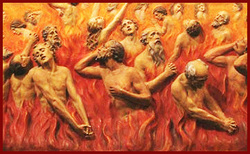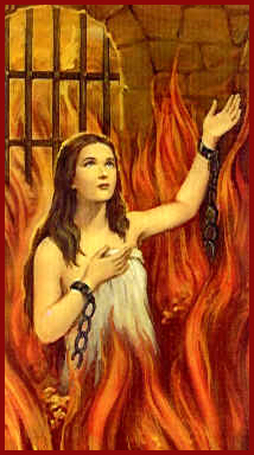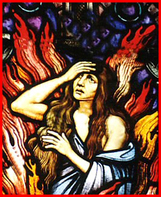| Devotion to Our Lady |
|
- Homepage
-
Daily Thoughts
- 2023 October Daily Thoughts
- Daily Thoughts Lent 2020
- Daily Thoughts for Advent 2019
- Daily Thoughts for October 2019
- Daily Thoughts for September 2019
- Daily Thoughts for August 2019
- Daily Thoughts for July
- Daily Thoughts for June
- Daily Thoughts for Easter 2019
- Daily Thoughts for Lent 2019
- Daily Thoughts for Christmas
- Daily Thoughts Easter 2022
- Consecration
- Easter Season
-
Spiritual Life
- Holy Mass Explained
- First Friday Devotions
- First Saturday Devotions
- The Mercy of God
- Vocations
- The Path Everyone Must Walk >
- Gift of Failure
- Halloween or Hell-O-Ween?
- Ignatian Spiritual Exercises >
- Meditation is Soul-Saving
- Spiritual Communion
- Miraculous Medal
- Enrollment in Miraculous Medal
- St. Benedict Medal
- Holy Water
- Advice on Prayer
- Your Daily Mary
-
Prayers
- September Devotions
- Seven Sorrows of Our Lady
-
Novenas
>
- NV-Help of Christians
- NV-Nativity of Our Lady
- NV-Seven Sorrows
- NV- Sorrowful Heart
- NV-Pope St Pius X
- NV-La Salette
- NV-St Michael Archangel
- NV-Immaculate Heart
- NV-Assumption
- NV-Novena for Fathers
- NV-Novena for Your Mother
- NV-St Raphael Archangel
- NV-Souls in Purgatory
- NV-All Saints Day
- NV-Christ the King
- NV-Divine Motherhood
- NV-Guardian Angels
- NV-Rosary
- NV-Mirac Med
- NV- Imm Conc
- NV - Guadalupe
- NV - Nativity of Jesus
- NV-Epiphany
- NV-OL Good Success
- NV-Lourdes
- NV-St Patrick
- NV-St Joseph
- NV-Annunciation
- NV-St Louis de Montfort
- NV-OL Good Counsel
- NV-Last Supper
- NV-Passion
- NV-Pentecost
- NV-Ascension
- NV-Sacred Heart
- NV-Sacred Heart & Perpetual Help
- NV-Corpus Christi
- NV-OL of Perpetual Help
- NV-Queenship BVM
- NV-OL of Mount Carmel
- NV-St Mary Magdalen
- NV- Im Hrt
- August Devotions to IHM
- Immaculate Heart of Mary
- Litany of Dependence
- Prayers to St Mary Magdalen
- Prayers in Times of Sickness Disease & Danger
- Holy Souls in Purgatory
- Meditations on the Litany of Our Lady
- Special Feast Days
- Prayers to Mary (Mon-Sun)
- Litanies to Our Lady >
- Various & Special Needs
- Our Lady of the Rosary
- Our Lady of Mt. Carmel
- Our Lady of Perpetual Help
- Our Lady of Guadalupe
- Other titles of Our Lady
-
Rosary
- Downloads
-
Holy Week
- Last Seven Words of Jesus >
- Characters of Passion >
- The Last Days of Christ
- Before Palm Sunday
- Palm Sunday
- Monday in Holy Week
- Tuesday in Holy Week
- Wednesday in Holy Week
- Holy Thursday (Last Supper)
- Holy Thursday (Agony & Arrest)
- Night Vigil with Christ
- Good Friday (Pilate & Herod)
- Good Friday (Way of Cross & Crucifixion)
- Saturday in Holy Week
-
Lent
- Ideas for Lent
- Daily Lenten Planner
- Daily Lenten Liturgy
- From Cold to Hot
- Lent with Aquinas
- Lent with Dom Gueranger
- Virtues for Lent
- History of Penance
- How Expensive is Sin?
- Confession of Sins
- Letter to Friends of the Cross
- Sermons for Lent
- Stations of the Cross >
- Lenten Prayers
- 7 Penitential Psalms
- Lenten Psalms SUN
- Lenten Psalms MON
- Lenten Psalms TUE
- Lenten Psalms WED
- Lenten Psalms THU
- Lenten Psalms FRI
- Lenten Psalms SAT
- Lenten Laughs
- Septuagesima
-
Christmas
- Epiphany Explained
- Suggestions for Christmas
- Food For Thought
- Christmas with Aquinas
- Christmas with Dom Gueranger
- Christmas Prayers
- Candles & Candlemas
- Christmas Sermons
- Christmas Prayers SUN
- Christmas Prayers MON
- Christmas Prayers TUE
- Christmas Prayers WED
- Christmas Prayers THU
- Christmas Prayers FRI
- Christmas Prayers SAT
- Twelve Days of Christmas >
-
Advent Journey
- Purgatory
- Christ the King
- Legion of Mary
- Scapular
- Sacred Heart
-
Saints
-
Martyrs for the Faith
>
- Your Daily Martyr >
- All 365 Days of Martyrs
- Cristeros
- St Valentine & Valentine's Day
- Martyrs--Thomas Becket
- Martyrs--John the Apostle
- Holy Machabees
- Age of Martyrdom
- Carmelites of Compiegne
- Martyrs--Peter & Paul
- Martyrs--John the Baptist
- Martyrs--Andrew
- Martyrs--James the Great
- Martyrs--North American
- Martyrs--Seven Holy Sleepers
- Martyrs--Afra
- School of Martyrdom
- Martyrs--Christina
- Desert Saints >
- Saints for Sinners >
- Saints of Mary >
- History of All Saints Day
-
Martyrs for the Faith
>
- Precious Blood
- Holy Ghost
- Synod 2023
-
Catechism
- Catechism Lesson 1
- Catechism Lesson 2
- Catechism Lesson 3
- Catechism Lesson 4
- Catechism Lesson 5
- Catechism Lesson 6
- Catechism Lesson 7
- Catechism Lesson 8
- Catechism Lesson 9
- Catechism Lesson 10
- Catechism Lesson 11
- Catechism Lesson 12
- Catechism Lesson 13
- Catechism Lesson 14
- Catechism Lesson 15
- Catechism Lesson 16
- Catechism Lesson 17
- Catechism Lesson 18
- Catechism Lesson 19
- Catechism Lesson 20
- Catechism Lesson 21
- Catechism Lesson 22
- Bible Study
-
Calendar
- Miracles
- Apparitions
- Shrines
- Prophecies
- Angels Homepage
- Hell
-
Church Crisis
- Conspiracy Theories
- Amazon Synod 2019 >
- Liberalism & Modernism
- Modernism--Encyclical Pascendi
- Modernism & Children
- Modernism--Documents
- The Francis Pages
- Church Enemies on Francis
- Francis Quotes
- Amoris Laetitia Critique
- Danger of Ignorance (Pius X)
- Restore all In Christ (Pius X)
- Catholic Action (Pius X)
- Another TITANIC Disaster?
- The "Errors of Russia"
- CRISIS PRAYERS
- Election Novena 2024
- The Anger Room
- War Zone
- Life of Mary
- Spiritual Gym
- Stupidity
- Coronavirus and Catholicism
- History & Facts
- Books
- Catholic Family
- Children
- Daily Quiz
-
Novena Church & Pope
- Day 01 Church-Pope Novena
- Day 02 Church-Pope Novena
- Day 03 Church-Pope Novena
- Day 04 Church-Pope Novena
- Day 05 Church-Pope Novena
- Day 06 Church-Pope Novena
- Day 07 Church-Pope Novena
- Day 08 Church-Pope Novena
- Day 09 Church-Pope Novena
- Day 10 Church-Pope Novena
- Day 11 Church-Pope Novena
- Day 12 Church-Pope Novena
- Day 13 Church-Pope Novena
- Day 14 Church-Pope Novena
- Day 15 Church-Pope Novena
- Day 16 Church-Pope Novena
- Day 17 Church-Pope Novena
- Day 18 Church-Pope Novena
- Day 19 Church-Pope Novena
- Day 20 Church-Pope Novena
- Day 21 Church-Pope Novena
- Day 22 Church-Pope Novena
- Day 23 Church-Pope Novena
- Day 24 Church-Pope Novena
- Day 25 Church-Pope Novena
- Day 26 Church-Pope Novena
- Day 27 Church-Pope Novena
- Day 28 Church-Pope Novena
- Day 29 Church-Pope Novena
- Day 30 Church-Pope Novena
- Day 31 Church-Pope Novena
- Day 32 Church-Pope Novena
- Day 33 Church-Pope Novena
- Day 34 Church-Pope Novena
- Day 35 Church-Pope Novena
- Day 36 Church-Pope Novena
- Day 37 Church-Pope Novena
- Day 38 Church-Pope Novena
- Day 39 Church-Pope Novena
- Day 40 Church-Pope Novena
- Day 41 Church-Pope Novena
- Day 42 Church-Pope Novena
- Day 43 Church-Pope Novena
- Day 44 Church-Pope Novena
- Day 45 Church-Pope Novena
- Day 46 Church-Pope Novena
- Day 47 Church-Pope Novena
- Day 48 Church-Pope Novena
- Day 49 Church-Pope Novena
- Day 50 Church-Pope Novena
- Day 51 Church-Pope Novena
- Day 52 Church-Pope Novena
- Day 53 Church-Pope Novena
- Day 54 Church-Pope Novena
- Penance Novena
- Daily WeAtheR Forecast
click on the page of your choice
| Why Souls Suffer in Purgatory | Saints Speak on Purgatory | Stories of Purgatory | History of All Souls Day |
| Read Me, Or Rue It | Unpublished Manuscript on Purgatory | Download Purgatory Posters |
| Why Souls Suffer in Purgatory | Saints Speak on Purgatory | Stories of Purgatory | History of All Souls Day |
| Read Me, Or Rue It | Unpublished Manuscript on Purgatory | Download Purgatory Posters |
Click on this line to read what Saints and Theologians say about Purgatory
(New updates daily from St. Alphonsus, St. Catherine of Genoa, St. Gertrude, St. Thomas Aquinas,
St. Padre Pio, Fr. Faber, Fr. Garrigou-Lagrange, and more)
(New updates daily from St. Alphonsus, St. Catherine of Genoa, St. Gertrude, St. Thomas Aquinas,
St. Padre Pio, Fr. Faber, Fr. Garrigou-Lagrange, and more)
EXAMPLES AND REASONS BEHIND SOULS BEING DETAINED IN PURGATORY
(Taken mainly from Fr. Schouppe's book, Purgatory Explained)
1. LUKEWARMNESS, LEVITY & HASTE IN PRAYER
|
We should treat holy things in a holy manner. All irreverence in religious exercises is extremely displeasing to God. When the Venerable Agnes of Langeac was Prioress of her convent, she very much recommended to her Religious respect and fervor in their relations with God, reminding them of these words of Holy Scripture: “Accursed be he that doth the work of God with negligence.” A sister of the community named Angelique died. Her Superior, the Venerable Agnes, was praying near her tomb, when she suddenly saw the deceased sister before her; she felt at the same time as though a flame of fire touched her face. Sister Angelique thanked her for having encouraged her to religious fervor, and particularly for often repeating the words, “Accursed be he that doth the work of God with negligence.”
“Continue, Mother," she added, "to urge the sisters to fervor; let them serve God with the utmost diligence, love Him with their whole heart, and with all the power of their soul. If they could but understand how rigorous are the torments of Purgatory, they would never be guilty of the least neglect." See what St. Peter Damian relates concerning St. Severin, Archbishop of Cologne, who had edified his church by an example of all virtues. His apostolic life, his great labors for the extension of God's kingdom in souls, merited for him the honors of canonization. Nevertheless, after his death he appeared to one of the priests of his cathedral to ask for prayers. This worthy priest could not understand why such a holy prelate as Severin, could be in need of prayers in the other life. The deceased Bishop replied: "It is true God gave me grace to serve Him with all my heart and to labor in His vineyard, but I often offended Him by the haste with which I recited the Holy Office (the Breviary). The occupations of each day so absorbed my attention, that when the hour of prayer came, I acquitted myself of that great duty without recollection, and sometimes at another hour than that appointed by the Church. At this moment I am expiating those infidelities, and God permits me to come and ask your prayers." The biography adds that St. Severin was six months in Purgatory for that one fault. Six months in a fire! Imagine that! Imagine the gravity of sin! We had better revalue our notions of sin, before we needlessly add to our already overloaded pile of debt! |
Venerable Sister Frances of Pampeluna, one day saw in Purgatory a poor priest whose fingers were eaten away by frightful ulcers. He was thus punished for having, at the altar, made the Sign of the Cross with too much levity, and without the necessary gravity.
She said that in general priests remain in Purgatory longer than laymen, and that the intensity of their torments is in proportion to their dignity. God revealed to her the fate of several deceased priests. One of them had to undergo forty years of suffering for having by his neglect allowed a person to die without the Sacraments; another remained there for forty-five years for having performed the sublime functions of his ministry with a certain levity. God wills that we should serve Him with our whole heart, and that we should avoid, in so far as the frailty of human nature will permit, even the slightest imperfections; but the care to please Him and the fear of displeasing Him must be accompanied by a humble confidence in His mercy. |
2. VANITY AND WORLDLINESS
|
VANITY
Souls that allow themselves to be dazzled by the vanities of the world, even if they have the good fortune to escape damnation, will have to undergo terrible punishment. Let us open the Revelations of St. Bridget, which are held in such esteem by the Church. We read there, in Book VI, that the saint saw herself transported in spirit into Purgatory, and that, among others, she saw there a young lady of high birth who had formerly abandoned herself to the luxury and vanities of the world. This unfortunate soul related to her the history of her life, and the sad state in which she then was. "Happily," said she, ''before death I confessed my sins in such dispositions as to escape Hell, but now I suffer here to expiate the worldly life that my mother did not prevent me from leading!" She then added: "Alas! This head of mine, which loved to be adorned, and which sought to draw the attention of others, is now devoured with flames inside and out, and these flames are so violent that, every moment, it seems to me that I must die. These shoulders, these arms, which I loved to see admired, are cruelly bound in chains of red-hot iron. These feet, formerly trained for the dance, are now surrounded with vipers that tear them with their fangs and soil them with their filthy slime. All these parts of the body which I have adorned with jewels, flowers, and a variety of other ornaments, are now a prey to the most horrible torture!" "O mother, mother!" she cried, "how culpable have you been in my regard! It was you who, by a fatal indulgence, encouraged my taste for display and extravagant expense; it was you that took me to theaters, parties, and dances, and to those worldly assemblies which are the ruin of souls. ... If I have not incurred eternal damnation, it was because a special grace of God's mercy touched my heart with sincere repentance. I made a good confession, and thus I have been delivered from Hell, yet only to see myself precipitated into the most horrible torments of Purgatory." |
WORLDLINESS
Blessed Mary Villani, a Dominican Religious, was transported in spirit to Purgatory. Among the souls that suffered there she saw one more cruelly tormented than the others, in the midst of flames which entirely enveloped her. Touched with compassion, Blessed Mary Villani questioned the soul. " I have been here," she replied, " for a very long time, punished for my vanity and my scandalous extravagance. Thus far I have not received the least alleviation. Whilst I was upon earth, being wholly occupied with my appearance, my pleasures, and worldly amusements, I thought very little of my duties as a Christian, and fulfilled them only with great reluctance, and in a slothful manner. My only serious thought was to further the worldly interests of my family. See now how I am punished : they bestow not so much as a passing thought upon me: my parents, my children, those friends with whom I was most intimate—all have forgotten me." |
3. LACK OF PENANCE, MORTIFICATION AND SACRIFICE
|
Fr. Schouppe writes: In our days there are Christians who are total strangers to the Cross and the mortification of Jesus Christ. Their effeminate and sensual life is but one chain of pleasures; they fear everything that is a sacrifice; scarcely do they observe the strict laws of fasting and abstinence prescribed by the Church.
Since they will not submit to any penance in this world, let them reflect on what will be inflicted upon them in the next. It is certain that, in this worldly life, they do nothing but accumulate debts. Since they omit to do penance, no part of the debt is paid, and a total is reached that terrifies the imagination. The venerable servant of God, Frances of Pampeluna, who was favored with several visions of Purgatory, saw, one day, a man of the world, who, although he had otherwise been a tolerably good Christian, passed fifty-nine years in Purgatory on account of seeking his ease and comfort. Another passed thirty-five years there for the same reason; a third, who had too strong a passion for gambling, was detained there for sixty-four years. Alas! These injudicious Christians have allowed their debts to remain before God, and those which they might so easily have acquitted by works of penance, they have had to pay afterwards by years of torture. If God is severe towards the rich and the pleasure-seekers of the world, He will not be less so towards princes, magistrates, parents, and, in general, towards all those who have the charge of souls and authority over others. We do well to often reflect upon Our Lord's words: “No, I say to you: but unless you shall do penance, you shall all likewise perish!” (Luke 13:3). “And I gave her a time that she might do penance, and she will not repent of her fornication … and they that commit adultery with her shall be in very great tribulation, except they do penance from their deeds” (Apocalypse 2:21-22). “God hath given him place for penance, and he abuseth it unto pride” (Job 24:23). |
4. LUKEWARMNESS & NEGLIGENCE TOWARDS GOD
|
Good Christians people, and priests or religious, who wish to serve God with their whole hearts, must avoid ship-wrecking on the rocks of lukewarmness, tepidity and negligence. God wishes be served with great fervor; those who are lukewarm, tepid and careless excite His disgust—as God Himself says in Scripture: “because thou art lukewarm, and neither cold, not hot, I will begin to vomit thee out of my mouth” (Apocalypse 3:16). He even goes so far as to threaten, with His malediction, those who perform holy actions in a careless manner—that is to say, He will severely punish in Purgatory all negligence in His service.
Among the disciples of St. Bernard of Clairvaux, there was one whose negligence sadly contrasted with the fervor of the rest of the monastery. Despite being both a Priest and a Religious, he allowed himself to sink into a deplorable state of lukewarmness. The moment of death arrived, and he was called to his judgment before God without having given any sign of amendment. Whilst the Mass of Requiem was being celebrated, a venerable Religious learned by an interior light, that though the deceased was not eternally lost, his soul was in a most miserable condition |
The following night the soul appeared to him in a sad and wretched condition. "Yesterday," he said, "you learned my deplorable fate; behold now the tortures to which I am condemned in punishment for my culpable lukewarmness." He then conducted the old monk to the edge of a large, deep pit, filled with smoke and flames. "Behold the place," said he, "where the ministers of Divine Justice have orders to torment me; they cease not to plunge me into this abyss, and draw me out only to precipitate me into it again, without giving me one moment's rest."
A holy Religious named Mary of the Incarnation, of the convent of the Ursulines, in Loudun, appeared some time after her death to her Superior, a woman of intelligence and merit, who wrote the details of the apparition to Father Surin of the Company of Jesus. "On November 6th," she wrote, "between three and four o'clock in the morning, Mother of the Incarnation stood before me, with an expression of sweetness on her countenance that appeared more like that of humility than of suffering; yet I saw that she suffered much. "I asked her in what state she was, and if we could render her any service. She replied, 'I satisfy Divine Justice in Purgatory.' I begged her to tell me why she was detained there. "She answered, 'It is for being negligent in several common exercises; a certain weakness by which I allowed myself to be led by the example of imperfect Religious. Ah! If Religious knew the wrong they do their souls by not applying themselves to perfection, and how dearly they shall one day expiate the satisfactions which they give themselves contrary to the light of their consciences, their efforts to do violence to themselves during life would be very different. Ah! God's point of view is different from ours, His judgments are different.' "I asked her to tell me whether she suffered much. 'My pains,' she replied, 'are incomprehensible to those who do not feel them.' Saying these words, she drew near my face to take leave of me. It seemed as though I was burned by a coal of fire, although her face did not touch mine; and my arm, which had barely grazed her mantle, was burned and caused me considerable pain." |
Web Hosting by Just Host






